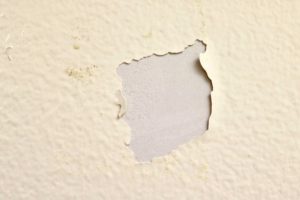Corrections: The original article said students who were damage billed were billed on average $50. This was incorrect, and the article has been corrected to say the average was less than $50. Also, the lede incorrectly said “every year.” This has been corrected as we only have data for last year. The headline has also been updated from “Half” to “Roughly Half” for accuracy and clarity.
By Erica Scalise

Last year, roughly half of Rose Hill residents are charged an average of less than $50 to their tuition bills for room damages such as broken furniture or chipped walls. Although about 15 percent of students contest fines, according to Douglas Spring, administrative manager for damage billing, some students meet these fines with confusion and dissatisfaction.
Students have acquired fines for damages both large and small, ranging from sweetheart candies left on the floor to obvious holes in the walls left behind from nails or command hooks.
Spring said that residents should clean to the best of their abilities. “We are reasonable, but if the entire room has accumulated a lot of dirt or dust, this is something a student would probably get fined for.”
Spring said the process is in line with the university’s Jesuit values.
“Cleaning the rooms and leaving them closest to the condition they were found in is what’s expected of students,” said Spring. “Damage billing tries to keep in line with the Jesuit values of the school. We want to hold people accountable for their actions as men and women for others.”
Some students from the class of 2020, who first experienced the damage billing process this past summer, responded negatively.
Brendan McShane, FCRH ’20, said he “is certain that the only actual damage in my room was a scratch. I neglected to take my carpet home and I was charged $100 at the end of the day. It’s also ridiculous to think that my roommate was charged the same amount.”
McShane said “claiming Jesuit values seems ridiculous” when it comes to the damage billing process and the fines he incurred.
McShane, who left his carpet behind, is just one of many students who said they were unaware that leaving an item in the room could constitute damage.
Abigail O’Connor, GSB ’20, said she thought the process did not give students enough time to respond.
“Sending emails to students in the summer and expecting them to promptly check them wasn’t fair,” she said.
“In terms of time to appeal, I think that one month is fair,” said Spring.
This past summer, the Office of Residential Life emailed its students on June 6th and 7th, notifying them of any damages incurred over the 2016-2017 school year. Students were told they had one month to appeal to Residential Life and were granted an additional grace period of two weeks to contest their damages. A reminder email was sent on June 28th.
Even with this system in place, some students feel they are being set up or forced to pay fines. Given that an appeal process takes additional time, many students would rather pay the fines than contest them.
“Honestly, it felt like a ploy by the school to get more money,” said O’Connor. “It shouldn’t require $150 to paint over a one inch piece of wall missing from a command strip.”
When asked how much money is generated from the damage billing process, Spring was unable to disclose.
There are currently 3,529 students living in housing and according to Spring, roughly half were fined over the 2016-2017 school year. “Yes, there have been some complaints, but for the most part the response is not angry.”
Damages can vary from building to building. For example, Spring said that in Finlay, the cost of repairing walls is more due to the size of the space.
“If the damage is extensive we do consider that and then go from there, but for the most part we use an itemized list of standard charges,” said Spring.
When checking out of the dorms at the end of the school year, students have their choice of the recommended express checkout which includes placing their key(s) in an envelope and signing a form, or a more extensive checkout in which their RA inspects the room for damages or items left behind. The express checkout is a faster process, but could also be a way for students to avoid getting their rooms inspected for damages. This could result in students being fined for the previous resident’s damages, especially if these damages were not documented properly.
“When billing students, I sometimes have to reach out to facilities and RA’s. It’s not the same exact process for everyone,” said Spring. “I take it case by case and give the due process to residents when they appeal.”
Residential Life encourages students to be mindful of things they can do to avoid being fined. There are ways that students can give back when cleaning their rooms in May.
“I encourage everyone to donate items to the Dorothy Day center before they throw them out at the end of the year,” said Spring.
Residential Life encourages students to look at the itemized list of damage fees on the Fordham website before vacating their dorms.


































































































































































































